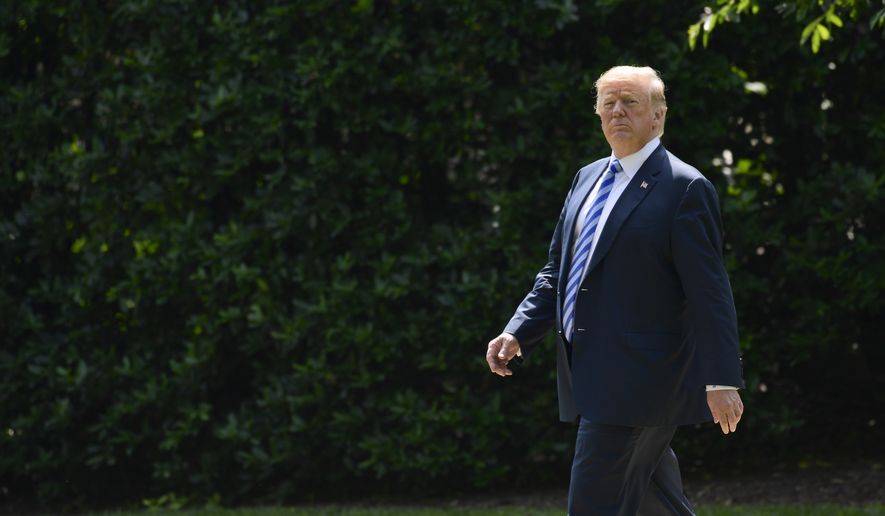Debate raged Sunday over whether President Trump has the power to pardon himself even as Republicans decried the speculation and declared such a move politically, if not legally, impossible.
Trump attorney Rudolph W. Giuliani insisted that the president had “no intention of pardoning himself,” telling NBC’s “Meet the Press” that such a scenario would be “unthinkable” and would “lead to probably an immediate impeachment.”
Asked if the president has the power to pardon himself, Mr. Giuliani said on ABC’s “This Week” that, “He’s not, but he probably does.”
JUST IN: Does Pres. Trump have the power to pardon himself?
— This Week (@ThisWeekABC) June 3, 2018
“He’s not, but he probably does,” Rudy Giuliani tells @GStephanopoulos. “He has no intention of pardoning himself, but that doesn’t say he can’t.” https://t.co/IEUEWnjQqe #ThisWeek pic.twitter.com/IE1AocigYl
The discussion was sparked by a confidential 20-page memo from the Trump legal team to special counsel Robert Mueller on his request for the president to testify on a host of topics related to the investigation on alleged Russian collusion and obstruction of justice.
In the January letter, which was leaked to media outlets, Trump attorneys argued that the president, as chief law enforcement officer, was constitutionally incapable of committing obstruction of justice and that “he could, if he wished, terminate the inquiry, or even exercise his power to pardon if he so desired.”
Former Trump campaign manager Corey Lewandowski said the letter amounted to an effort to head off a subpoena from the Mueller legal team as the opposing sides attempted to negotiate the terms of an interview.
“There’s a way to avoid a potential constitutional issue on this, which is working with Mayor Giuliani and his legal team and the Mueller investigators,” Mr. Lewandowski told “Fox News Sunday.”
Even if negotiations fall apart, Republicans said it was unimaginable that Mr. Trump would pardon himself rather than submit to a subpoena.
“There’s no way that will happen. And the reason it won’t is that it then becomes a political problem,” New Jersey Gov. Chris Christie said on ABC’s “This Week.” “If the president were to pardon himself, he’ll get impeached.”
Fueling the speculation was the president’s high-profile pardon Thursday of conservative author and filmmaker Dinesh D’Souza, who pleaded guilty in 2014 to a charge of violating campaign-finance laws.
“I think the political ramifications of that would be tough,” Mr. Giuliani said. “Pardoning other people is one thing. Pardoning yourself is another.”
Mr. Giuliani told ABC News on Saturday that the legal strategy laid out in the letter is still in place, adding that, “If [Robert] Mueller tries to subpoena us, we’re going to court.”
House Majority Leader Kevin McCarthy emphasized that the president “is not saying he is going to pardon himself.”
“I don’t know why we’re walking through hypotheticals here in this process,” said Mr. McCarthy on CNN’s “State of the Union.” “The president has never said he would pardon himself. I don’t know where the president would go forward pardoning himself, but I don’t think a president should pardon themselves.”
Mr. Lewandowski dismissed political strategist Roger Stone’s comments suggesting that the D’Souza pardon was a “signal” to Mr. Mueller that the president may pardon figures at the center of the investigation into possible Russian collusion.
“There’s absolutely no evidence whatsoever that the president has ever discussed having a pardon for Michael Flynn or Paul Manafort or anybody else for that matter,” Mr. Lewandowski said. “And with all due respect to Roger Stone, I don’t think he has any idea what he’s talking about.”
Preet Bharara, a former U.S. attorney fired last year by Mr. Trump, said that defense counsel will often take “extreme positions” in communications with opposing counsel.
“It’s not crazy and it’s not unique that these folks are taking a very, very, very sort of broad position. Defense lawyers do that all the time,” Mr. Bharara said on “State of the Union.” “The difference here is they’re taking this position on behalf of the president of the United States.”
While “I think most people think that the president obviously in a special position,” Mr. Bharara added that the letter pays “lip service” to the president not being above the law, but that “most of the rest of the letter suggests that he is.”
Dated Jan. 29, 2018, the letter leaked to the New York Times and Fox News was titled, “Request for Testimony on Alleged Obstruction of Justice.”
Asked if the legal argument laid out in the letter is commonly held, Mr. Bharara said, “Here’s the problem. It doesn’t come up that often. It comes up almost never.”
“It’s not crazy and it’s not unique that these folks are taking a very, very, very sort of broad position,” Mr. Bharara added. “Defense lawyers do that all the time. The difference here is they’re taking this position on behalf of the president of the United States.”
• Valerie Richardson can be reached at vrichardson@washingtontimes.com.




Please read our comment policy before commenting.